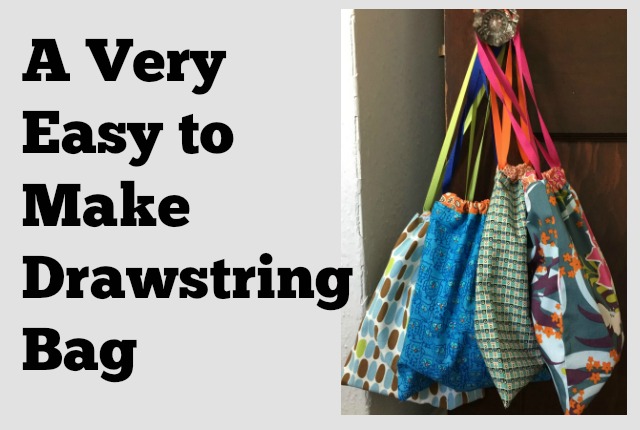
Drawstring bags are easy to make, but this drawstring bag was incredibly easy to make. You won’t believe how fast it came together. Perfect for toting a craft project, separating your shoes from your clothes in a suitcase or for holding smaller items together in a larger tote. You can customize the size without doing math and use up scraps from your stash.
This drawstring bag is based on one I saw and was going to sew to give away as gifts. However, it had to be modified after I read that the bag was lined. It’s not that I mind a little lining it’s that I already spent far too long picking out the fabrics for the outside of the bags. There was no way was I going to make any more decisions on what fabric to use.
So I figured out how to eliminate the lining and in doing so made it simpler and faster to sew and use less fabric.
This tutorial uses a serger (having just recently got one I’m all about using it) but you can sew this entirely with a conventional sewing machine. If you do there will be one extra step but I promise this will still be a super fast and easy project.
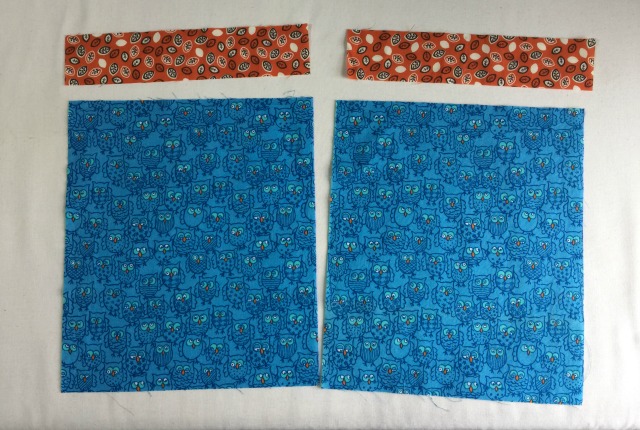
You will need:
- A back and a front cut the same size for the bag. (Mine is 10″ wide by 12 1/2″ tall)
- Two strips cut the same width as your bag and 2″ / 50mm tall for the casing.
- Two pieces of cording or ribbon (1/2″ / 10mm wide) for the drawstrings each as long as 3x the width of your bag. (a 10″ wide bag needs 2 pieces each 30″ long). After cutting to length apply some Fray Check on the ends to prevent them from unraveling.
- Miscellaneous Tools: bodkin
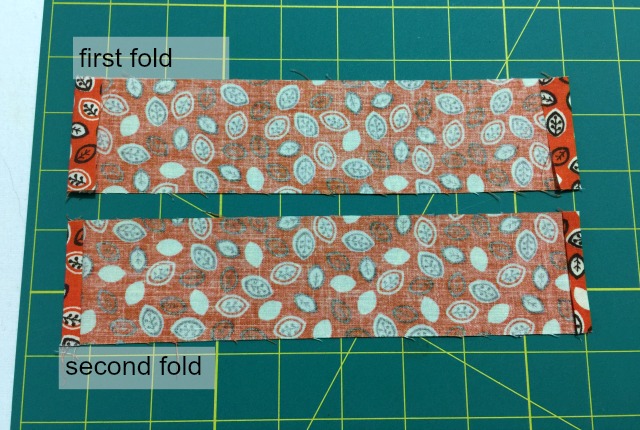
Fold the short ends of the casing pieces in 1/2″ / 10mm and press.
Fold the raw edge back in, under itself and press. Do this to both pieces.
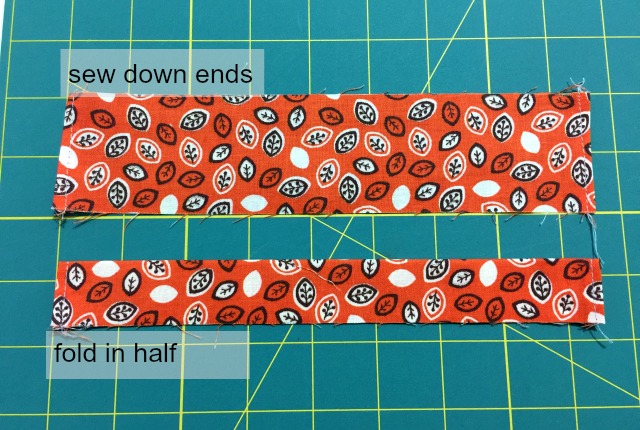
Sew the folded edge down catching all of the layers on the ends. Press.
Fold the casing strips in half lengthwise and press.
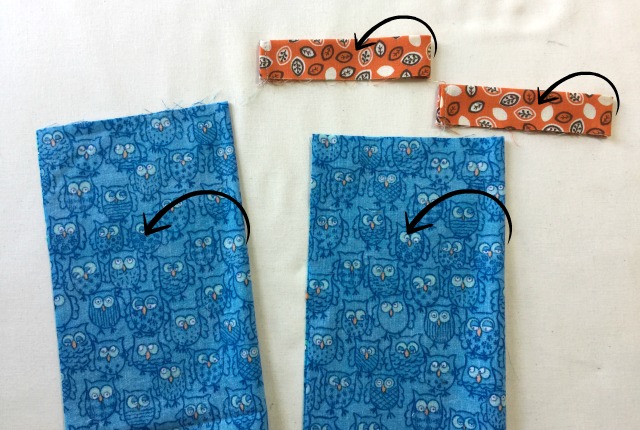
Find the center of the casing strips and the bag pieces by folding them in half. Finger press the fold hard enough to leave a crease.
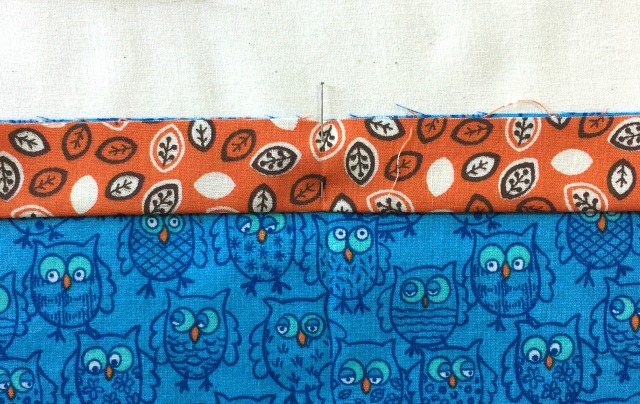
Place a casing strip on the right side of one bag piece lining up the raw edge of the strip with the top edge of the bag. Lining up the creases you just made will center the strip onto the bag. Pin to hold in place. Do the same with the remaining casing strip and bag piece.
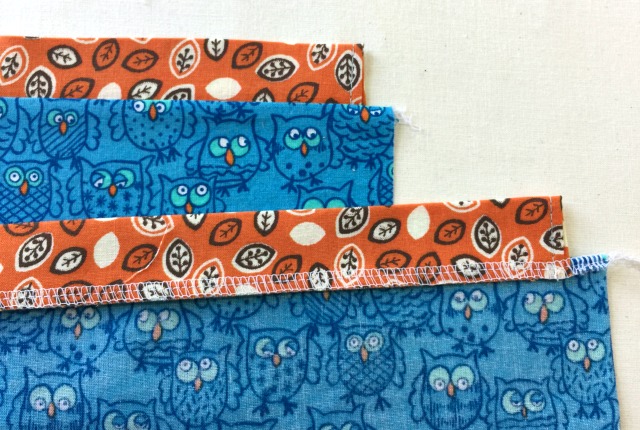
Serge the bag and the strip together using 1/4″ / 6mm seam allowance.
If you are not using a serger then sew this seam with a 1/4″ / 6mm seam allowance AND (the one extra step) after sewing the seam run a wide zig-zag stitch over the edge of the seam allowances to encase the raw edge.
Press the casing strip up and the seam allowances down.
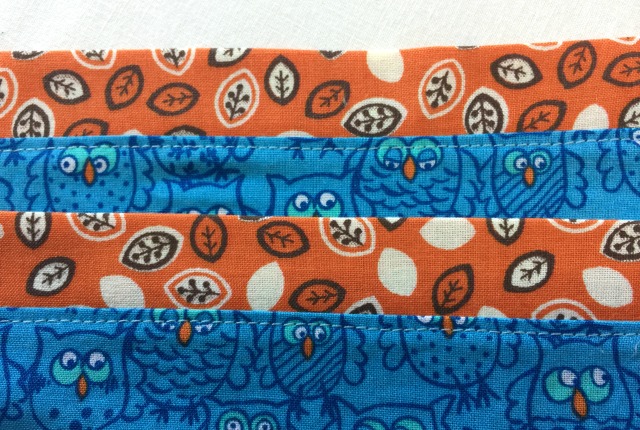
Topstitch on the front through the bag catching the seam allowance on the underside.
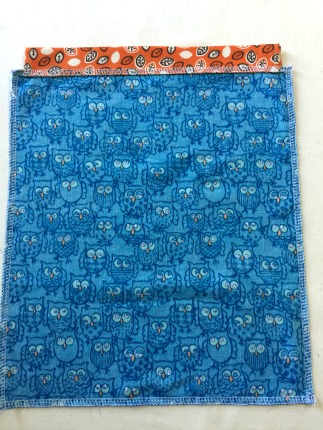
Pin the two bag pieces together, right sides together. Sew around the sides and bottom using a 1/4″ / 6mm seam allowance. I serged this seam but you do not need to nor do you need to zig-zag over the seam allowance if you do not use a serger.
Turn right side out and press.
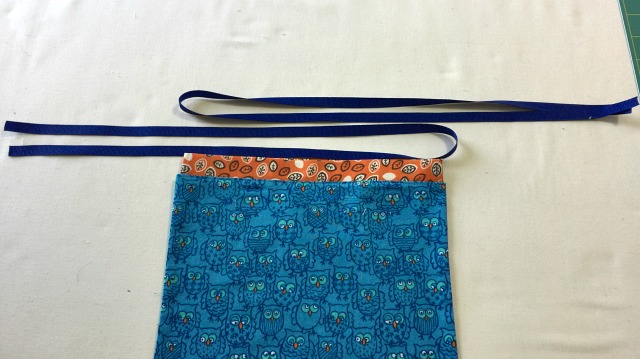
Your cording or ribbon (grosgrain ribbon pictured above) will be feed into the casings in this way.
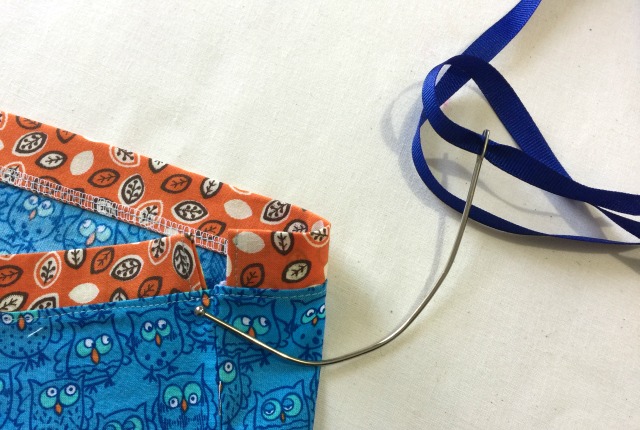
Place your cord or ribbon into your bodkin (mine is customized, or some would say, bent). Start at either the right or left side of the bag and insert the bodkin into the casing which is laying on the top.
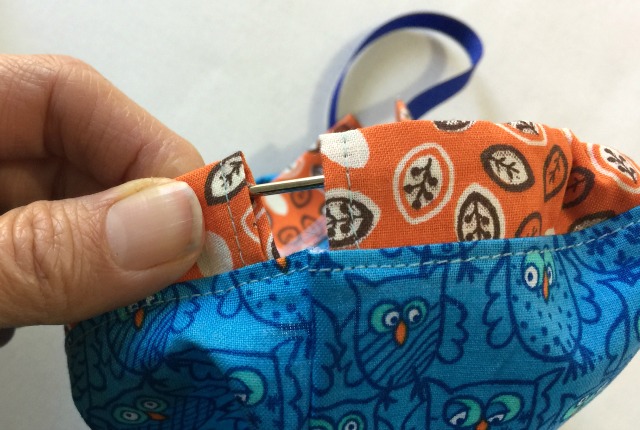
When you get to the gap on the other side, jump it, and insert the bodkin into the next casing.
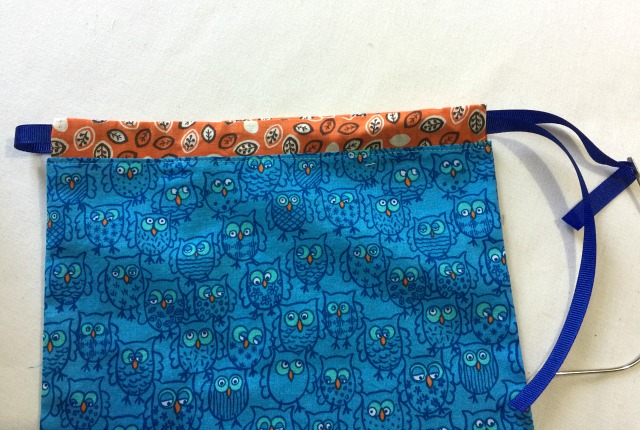
Bring the bodkin out at the end of the bottom casing. The ribbon enters into the right side, top casing and exits out the right side, bottom casing (or left side but top and bottom stay the same).
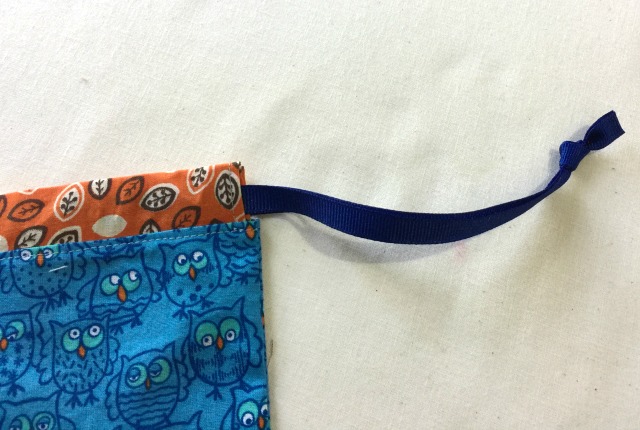
Tie the ends of the ribbon together. Make the knot at the end of the ribbon.
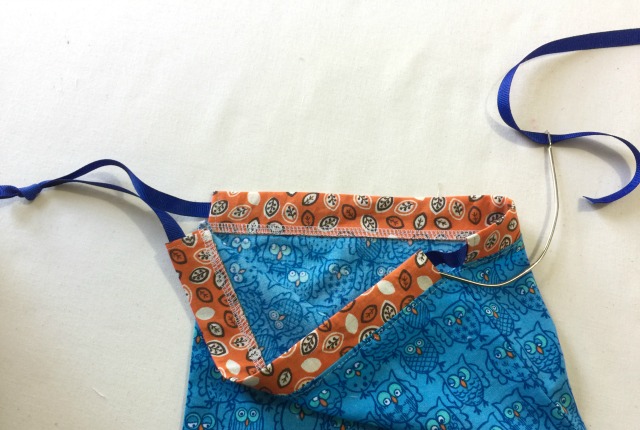
Feed the second ribbon into the casings the same way as the first but start on the opposite side than the first ribbon. Since I am right handed I started on the right both times but I flipped the bag over so I would be starting on the opposite side the second time.
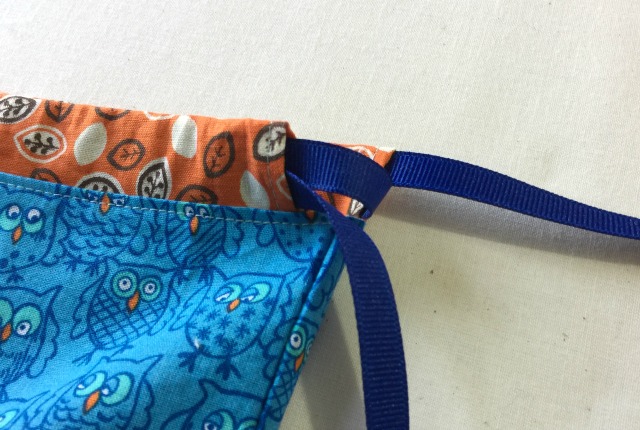
The second ribbon entering and exiting the casings.
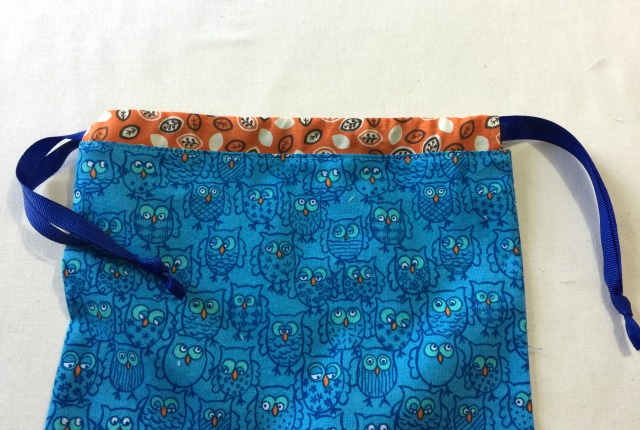
Tie the ends of the second ribbon. If you haven’t already, apply Fray Check to the cut ends of the ribbon or cord to stop them from unraveling.
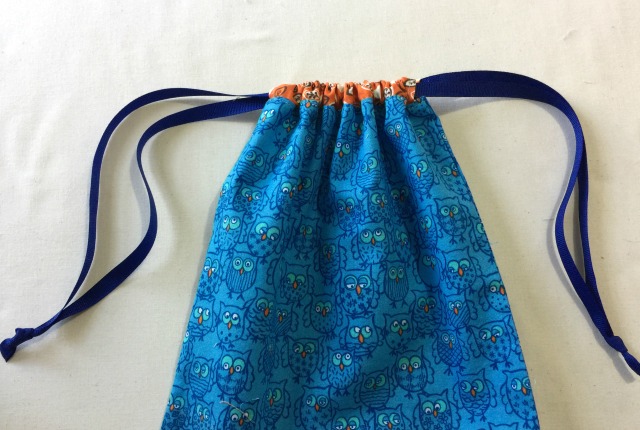
To close this bag, pull on the ribbons on both sides.
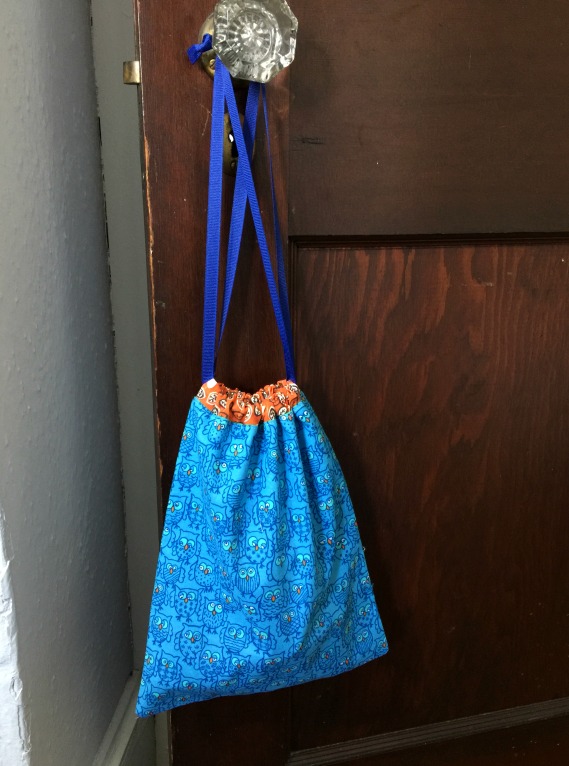
This one is done.
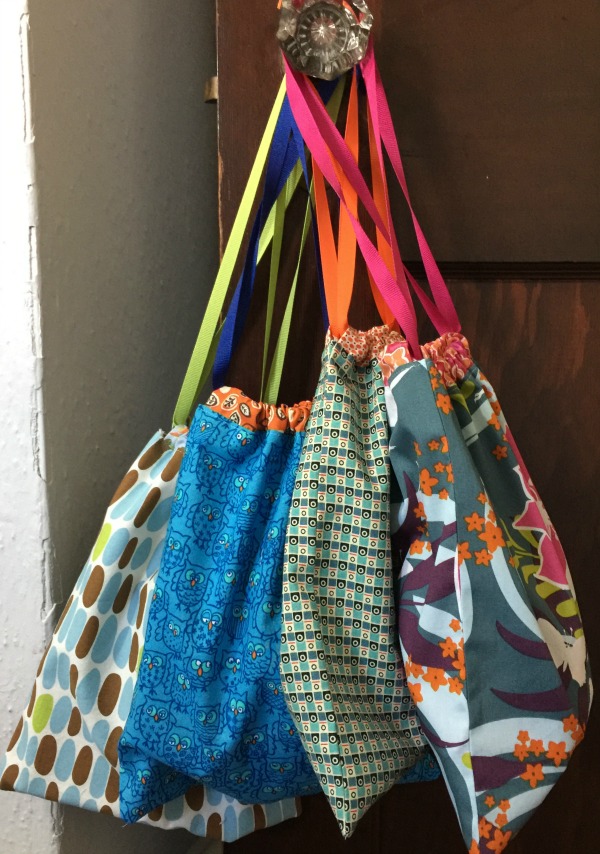
And so are these. To make it go even faster I made these at the same time, assembly line style. If you make more than one at the same time choose a thread for the machine and serger that coordinates with all of your fabric to avoid any rethreading.
How could you make this project suit your style?
- The casing and the bag can be the same fabric
- You could box the bottom corners
- Make the casing wider to really be seen
- Add a patch pocket to the outside to hold peanut M&Ms
- Really use your scraps and make the bag patchwork or bands of different fabrics
- Make it in tulle or mesh for holding gym clothes inside your bigger tote
- Line it 😉
Hope you found this just as quick and easy as I did. Any questions please let me know, I’m here to help.

I’ve made a few of these and they are super easy and quick to make. Thank you for the tutorial!
I have a question though: how do you keep the serger threads from unraveling?
Ah, the serger threads. Well, you leave a tail about 3 inches long of serger threads. Thread the end of the tail with a darning needle (big eye, blunt point. Then insert the needle back through the serged seam.
The tail goes back through/under the seam it came off of.
Or heck, it wouldn’t be pretty but you could tie the tail in a knot on itself up close to the seam and add a drop of fray check on the knot. Then cut off the excess.
I’m glad you like the tutorial. I like how fast and easy this way sews up.
Love this absolutely unfussy and easy to make bag. Thank you!
yes it is. I’m glad you like it